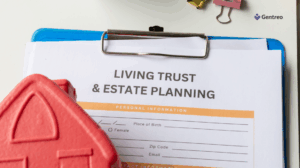
Blending families brings together unique joys and challenges, and when it comes to estate planning, there’s an extra layer of complexity to consider. In this article, we delve into the world of estate planning for blended families and explore the strategies that can help ensure your assets are distributed according to your wishes.
Blended families consist of individuals who have remarried or entered into a new relationship after a previous marriage or relationship. These families often include biological children, stepchildren, and ex-spouses. Estate planning for blended families requires careful consideration of the financial future of all members involved. This means making decisions about inheritance, guardianship, and healthcare directives that take into account the needs of both biological and stepchildren, as well as any ex-spouses.
Challenges unique to blended families in estate planning
Estate planning for blended families comes with its own set of challenges. One of the main challenges is ensuring that everyone’s interests are protected and that assets are distributed according to your wishes. Without proper planning, conflicts can arise between biological children, stepchildren, and ex-spouses, leading to lengthy legal battles and strained relationships.
Another challenge is determining how to provide for both biological and stepchildren. Many blended families want to ensure that their stepchildren are taken care of, but also want to provide for their biological children. Striking a balance between the two can be complex and requires careful consideration.
Importance of open communication in estate planning for blended families
Open communication is vital when it comes to estate planning for blended families. It’s important to have open and honest conversations with all parties involved to ensure that everyone’s wishes and expectations are understood. This can help prevent misunderstandings and conflicts down the line.
During these discussions, it’s important to discuss your goals and intentions for your estate plan. Talk about how you want your assets to be distributed, who you want to act as guardians for minor children, and any specific healthcare directives you may have. Encourage all family members to express their concerns and desires, and work together to find solutions that are fair and equitable.
Essential documents for estate planning in blended families
When it comes to estate planning for blended families, there are several essential documents that should be considered. These documents help ensure that your wishes are carried out and that your assets are distributed according to your intentions.
A will is a foundational document that outlines how you want your assets to be distributed after your death. In a blended family, a will can be used to specify how you want your assets to be divided between biological and stepchildren, as well as any ex-spouses.
A trust is another important document that can be used in estate planning for blended families. A trust allows you to set aside assets for the benefit of specific individuals or groups, such as stepchildren or minor children. By creating a trust, you can ensure that your assets are protected and distributed according to your wishes.
Determining beneficiaries and assets in blended family estate planning
Determining beneficiaries and assets is a crucial step in estate planning for blended families. It’s important to carefully consider who you want to include as beneficiaries in your estate plan and how you want your assets to be distributed.
When it comes to blended families, it’s important to be clear about your intentions and to update your beneficiaries as necessary. This may involve designating specific assets for certain individuals or creating separate trusts for different beneficiaries. By being clear and specific in your estate plan, you can help minimize the potential for conflicts and ensure that your wishes are carried out.
Considerations for minor children in blended family estate planning
If you have minor children in a blended family, it’s important to consider their needs and well-being in your estate plan. This includes appointing guardians who will take care of your children in the event of your death or incapacity.
When choosing a guardian, it’s important to consider the dynamics of your blended family and the relationships between all family members. It’s also important to discuss your choice with the potential guardian to ensure that they are willing and able to take on the responsibility.
Additionally, you may want to consider setting up a trust to provide for the financial needs of your minor children. A trust can help ensure that their inheritance is managed and protected until they reach a certain age or milestone.
Estate planning strategies to minimize conflict in blended families
Estate planning for blended families can be complex, but there are strategies that can help minimize conflict and ensure that everyone’s interests are protected.
One strategy is to use a prenuptial agreement or a postnuptial agreement. These agreements can help clarify how assets will be divided in the event of divorce or death. By having a clear agreement in place, you can help prevent disputes and ensure that your assets are distributed according to your wishes.
Another strategy is to use a trust to hold and distribute assets. A trust can provide added protection and flexibility, allowing you to specify how and when assets will be distributed. By using a trust, you can help minimize the potential for conflicts and ensure that your wishes are carried out.
Seeking professional help for estate planning in blended families
Navigating the complexities of estate planning for blended families can be overwhelming, which is why it’s important to seek the guidance of an experienced estate planning professional. An estate planning attorney can help you understand the legal requirements and options available to you, and can assist you in creating an estate plan that meets your specific needs.
When choosing an estate planning professional, look for someone who has experience working with blended families. They will have a deep understanding of the unique challenges and considerations involved and can provide valuable insights and guidance.
Updating and reviewing your estate plan regularly
Once you have created your estate plan, it’s important to regularly review and update it as needed. Life circumstances can change, and it’s important to ensure that your estate plan reflects your current wishes and circumstances.
Review your estate plan at least once a year, and also after major life events such as marriage, divorce, the birth or adoption of a child, or the death of a loved one. By keeping your estate plan up to date, you can help ensure that your wishes are carried out and that your blended family is protected.
Conclusion: Securing the future for your blended family
Estate planning for blended families requires thoughtful planning, open communication, and the guidance of an experienced professional. By addressing the unique challenges and considerations of blended families, you can ensure that your assets are distributed according to your wishes and that your blended family is protected.
Whether you’re a stepparent looking to provide for your stepchildren, a biological parent wanting to safeguard your assets, or an individual in a blended family seeking clarity and peace of mind, the strategies and insights shared in this article will equip you with the knowledge necessary to make informed decisions about your estate plan. Take the necessary steps today to secure the future for your blended family.
Don’t wait until it’s too late; start your estate planning journey with Gentreo today. By doing so, you’ll not only protect your loved ones but also gain the peace of mind that comes with knowing your legacy is secure. Click here to join now https://private.gentreo.com/auth/register.







